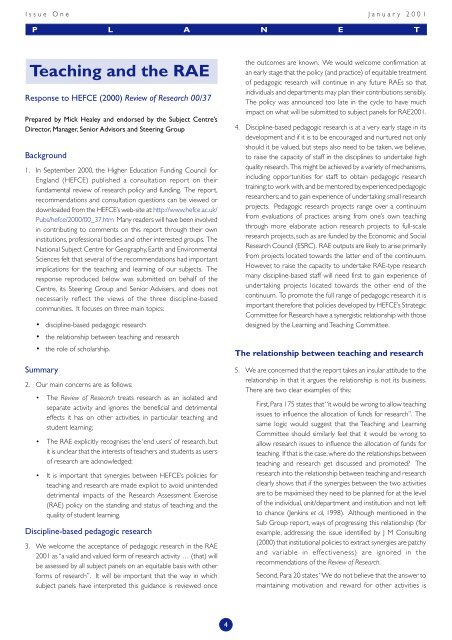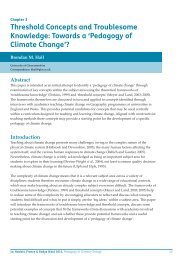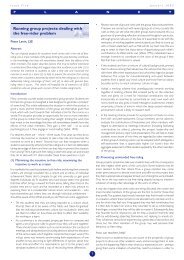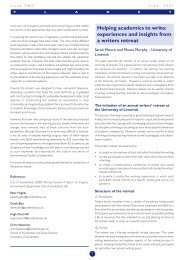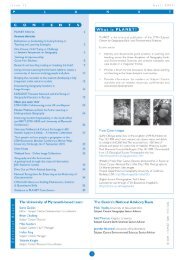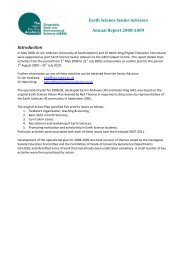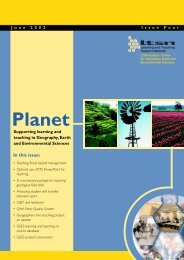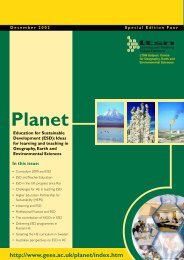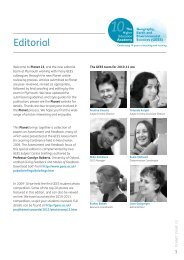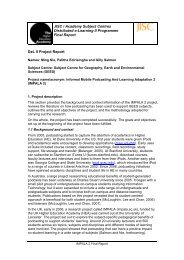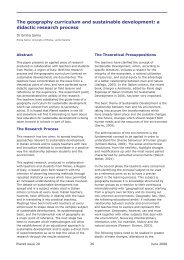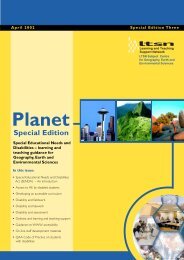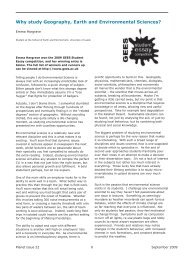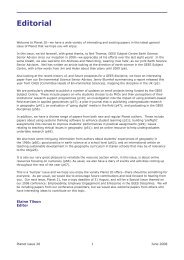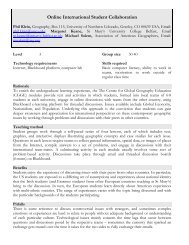Download this PDF - GEES Subject Centre Home
Download this PDF - GEES Subject Centre Home
Download this PDF - GEES Subject Centre Home
You also want an ePaper? Increase the reach of your titles
YUMPU automatically turns print PDFs into web optimized ePapers that Google loves.
Issue One January 2001<br />
P L A N E T<br />
Teaching and the RAE<br />
Response to HEFCE (2000) Review of Research 00/37<br />
Prepared by Mick Healey and endorsed by the <strong>Subject</strong> <strong>Centre</strong>’s<br />
Director, Manager, Senior Advisors and Steering Group<br />
Background<br />
1. In September 2000, the Higher Education Funding Council for<br />
England (HEFCE) published a consultation report on their<br />
fundamental review of research policy and funding. The report,<br />
recommendations and consultation questions can be viewed or<br />
downloaded from the HEFCE’s web-site at: http://www.hefce.ac.uk/<br />
Pubs/hefce/2000/00_37.htm Many readers will have been involved<br />
in contributing to comments on <strong>this</strong> report through their own<br />
institutions, professional bodies and other interested groups. The<br />
National <strong>Subject</strong> <strong>Centre</strong> for Geography, Earth and Environmental<br />
Sciences felt that several of the recommendations had important<br />
implications for the teaching and learning of our subjects. The<br />
response reproduced below was submitted on behalf of the<br />
<strong>Centre</strong>, its Steering Group and Senior Advisers, and does not<br />
necessarily reflect the views of the three discipline-based<br />
communities. It focuses on three main topics:<br />
• discipline-based pedagogic research<br />
• the relationship between teaching and research<br />
• the role of scholarship.<br />
Summary<br />
2. Our main concerns are as follows:<br />
• The Review of Research treats research as an isolated and<br />
separate activity and ignores the beneficial and detrimental<br />
effects it has on other activities, in particular teaching and<br />
student learning;<br />
• The RAE explicitly recognises the ‘end users’ of research, but<br />
it is unclear that the interests of teachers and students as users<br />
of research are acknowledged;<br />
• It is important that synergies between HEFCE’s policies for<br />
teaching and research are made explicit to avoid unintended<br />
detrimental impacts of the Research Assessment Exercise<br />
(RAE) policy on the standing and status of teaching and the<br />
quality of student learning.<br />
Discipline-based pedagogic research<br />
3. We welcome the acceptance of pedagogic research in the RAE<br />
2001 as “a valid and valued form of research activity … (that) will<br />
be assessed by all subject panels on an equitable basis with other<br />
forms of research”. It will be important that the way in which<br />
subject panels have interpreted <strong>this</strong> guidance is reviewed once<br />
the outcomes are known. We would welcome confirmation at<br />
an early stage that the policy (and practice) of equitable treatment<br />
of pedagogic research will continue in any future RAEs so that<br />
individuals and departments may plan their contributions sensibly.<br />
The policy was announced too late in the cycle to have much<br />
impact on what will be submitted to subject panels for RAE2001.<br />
4. Discipline-based pedagogic research is at a very early stage in its<br />
development and if it is to be encouraged and nurtured not only<br />
should it be valued, but steps also need to be taken, we believe,<br />
to raise the capacity of staff in the disciplines to undertake high<br />
quality research. This might be achieved by a variety of mechanisms,<br />
including opportunities for staff: to obtain pedagogic research<br />
training; to work with, and be mentored by, experienced pedagogic<br />
researchers; and to gain experience of undertaking small research<br />
projects. Pedagogic research projects range over a continuum<br />
from evaluations of practices arising from one’s own teaching<br />
through more elaborate action research projects to full-scale<br />
research projects, such as are funded by the Economic and Social<br />
Research Council (ESRC). RAE outputs are likely to arise primarily<br />
from projects located towards the latter end of the continuum.<br />
However, to raise the capacity to undertake RAE-type research<br />
many discipline-based staff will need first to gain experience of<br />
undertaking projects located towards the other end of the<br />
continuum. To promote the full range of pedagogic research it is<br />
important therefore that policies developed by HEFCE’s Strategic<br />
Committee for Research have a synergistic relationship with those<br />
designed by the Learning and Teaching Committee.<br />
The relationship between teaching and research<br />
5. We are concerned that the report takes an insular attitude to the<br />
relationship in that it argues the relationship is not its business.<br />
There are two clear examples of <strong>this</strong>:<br />
First, Para 175 states that “it would be wrong to allow teaching<br />
issues to influence the allocation of funds for research”. The<br />
same logic would suggest that the Teaching and Learning<br />
Committee should similarly feel that it would be wrong to<br />
allow research issues to influence the allocation of funds for<br />
teaching. If that is the case, where do the relationships between<br />
teaching and research get discussed and promoted? The<br />
research into the relationship between teaching and research<br />
clearly shows that if the synergies between the two activities<br />
are to be maximised they need to be planned for at the level<br />
of the individual, unit/department and institution and not left<br />
to chance (Jenkins et al, 1998). Although mentioned in the<br />
Sub Group report, ways of progressing <strong>this</strong> relationship (for<br />
example, addressing the issue identified by J M Consulting<br />
(2000) that institutional policies to extract synergies are patchy<br />
and variable in effectiveness) are ignored in the<br />
recommendations of the Review of Research.<br />
Second, Para 20 states “We do not believe that the answer to<br />
maintaining motivation and reward for other activities is<br />
4


